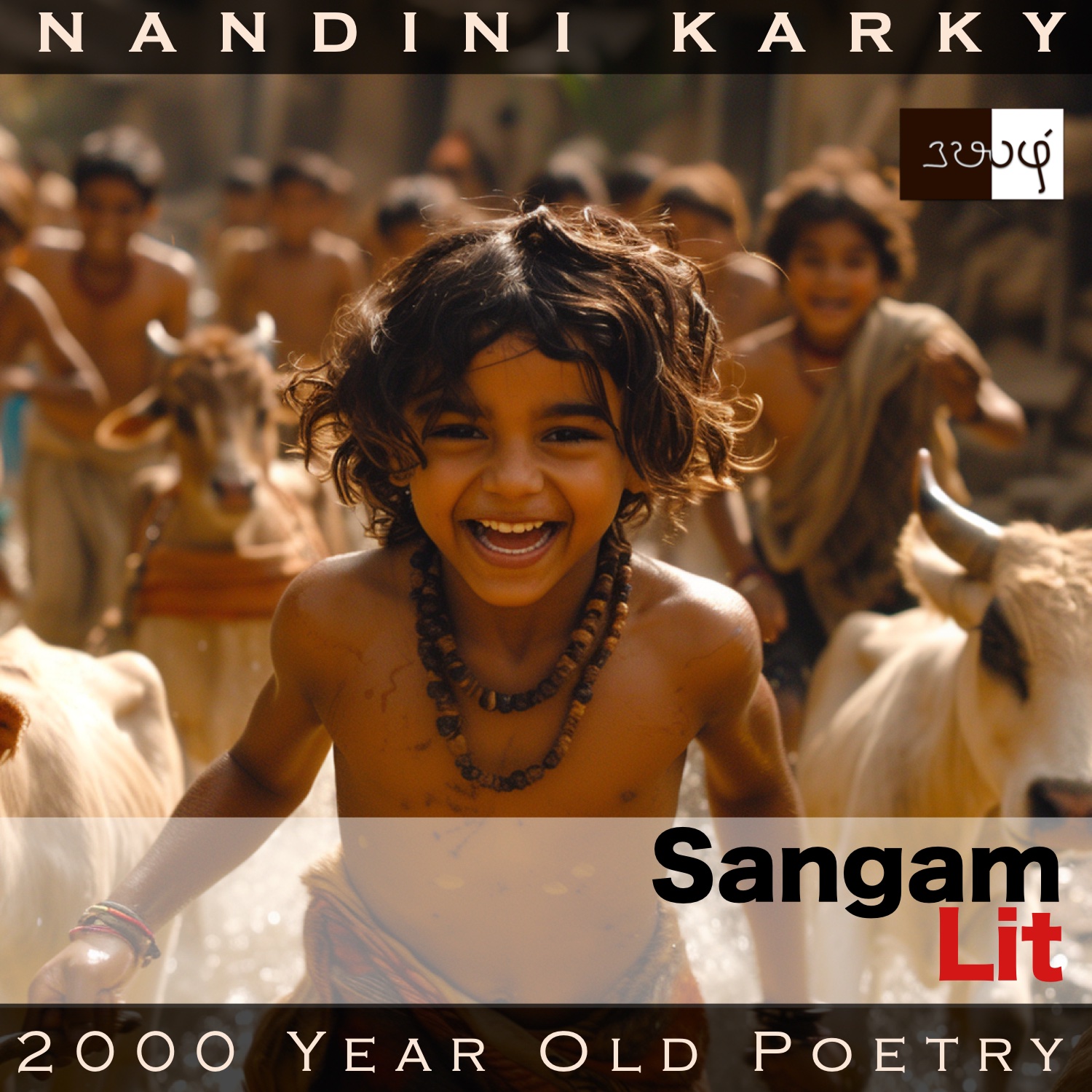Podcast: Play in new window | Download
Subscribe: Apple Podcasts | Spotify | Amazon Music | Android | iHeartRadio | TuneIn | RSS | More
In this episode, we take in domestic scenes of everyday life, as depicted in Sangam Literary work, Puranaanooru 319, penned by the poet Alangudi Vanganaar. Set in the category of ‘Vaagai Thinai’ or ‘Victory’, the verse echoes the trust in the triumphant return of a king.

பூவல் படுவில் கூவல் தோண்டிய
செங் கண் சில் நீர் பெய்த சீறில்
முன்றில் இருந்த முது வாய்ச் சாடி
யாம் கஃடு உண்டென, வறிது மாசு இன்று;
படலை முன்றில் சிறு தினை உணங்கல்
புறவும் இதலும் அறவும் உண்கெனப்
பெய்தற்கு எல்லின்று பொழுதே; அதனான்,
முயல் சுட்ட ஆயினும் தருகுவேம்; புகுதந்து
ஈங்கு இருந்தீமோ, முது வாய்ப் பாண!
கொடுங் கோட்டு ஆமான் நடுங்கு தலைக் குழவி
புன் தலைச் சிறாஅர் கன்று எனப் பூட்டும்
சீறூர் மன்னன் நெருநை ஞாங்கர்,
வேந்து விடு தொழிலொடு சென்றனன்; வந்து, நின்
பாடினி மாலை அணிய,
வாடாத் தாமரை சூட்டுவன் நினக்கே.
A verse filled with interesting elements that sketch the life of ancients vividly. The poet’s words can be translated as follows:
“A little water from the red well dug in the red soil ravine can be found in the front yard of the little house in a wide-mouthed jar and I know for sure that it’s clear and flawless; To spread dried grains of little millets in the wide front yard as bait to attract pigeons and quails, the time isn’t right, for the day is gone and night is here; But still, we can give you roasted rabbit; Come in to stay and rest here, O wise bard! Young calves with quivering heads, young ones of the wild cow with curving horns, are tied up by soft-haired young children to their toy chariots in the small town ruled by this king. He left yesterday to complete a mission for the emperor; He is sure to return and offer a garland to your singer companion and a crown of an unfading lotus to you!”
Let’s take a closer look at the lines here. The verse is addressed to a poor bard, who has come a long way, seeking support from a patron and the poet speaks in the voice of a person, who belongs to the town ruled by this patron. Pointing to a wide-mouthed jar, which can be found in the front yard of that little house, the poet says there’s water there, pure and drinkable, drawn from a well dug in a red soil ravine. The specific mention of this red soil well makes us think that maybe the water has a special taste and flavour. Why is this water jar being pointed to? Let’s return to the significance in a short while.
Next, the poet speaking in the voice of that townsperson says it’s too late in the day to be spreading dried grains as bait for birds such as pigeons and quails, for these are now happily resting in their nests as the sun sets. While that may be so, smoked rabbit is readily available, says the townsperson in an encouraging voice to the listening bard. Then, the townsperson launches into a description of their town calling it a place where young children catch hold of calves and tie it to their toy chariots and play gleefully. From that description of the place, the townsperson then talks about how the ruler of that town had left the previous day to do the bidding of his superior, who could be a Velir King or one of the three Chera, Chozha or Pandya emperors. This could be to lend support in that king’s war. And finally, the poet speaking as the townsperson requests the bard to stay and rest there and concludes with the assurance that the ruler would return with all success and crown the waiting bard with a golden lotus!
Reverting back to the messages given one after the other to this bard, we find that water in a jar is the first thing pointed out. Even today, when a visitor enters a Tamil home, the first thing done is to offer them water. This is a practice that must have evolved out of common sense and basic humanity because a traveller in these tropical parts more often than not comes walking under the hot sun, with thirst assailing their throats. And, this is why, cool and clear water in a jar is being pointed out to this travelling bard. Thirst quenched and now, the attention turns to hunger. Through this verse, we understand how birds were caught and cooked and this was considered a special treat for guests. In the absence of that meat, roasted rabbit is being offered as an alternative to the guest. The other striking element is the sound of little children laughing aloud, chasing calves, tying them to their toy chariots, engaging in pretend play, and in a nutshell, enjoying their day in an attitude of carefree abandon. This reflects a life of leisure and enjoyment. Any society that cares about the mental well-being of their young ones is on the right path indeed as vouched by the discovery of a huge load of toys in the most prominent civilisations in the past. The lines of this verse stand shoulder to shoulder with the discovery of huge number of objects of leisure discovered at Keezhadi. Even though the verse dwells on the repeated theme of a leader’s assured generosity and undoubtable victory, in the by-lanes, we get to glimpse various facets of hospitality and leisure in these living places of the past!




Share your thoughts...